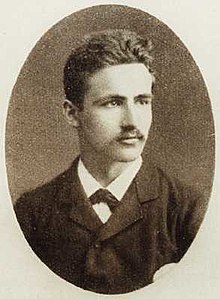Lulu plays
| Frank Wedekind | |
|---|---|

in 1883
|
|
| Born |
Benjamin Franklin Wedekind July 24, 1864 Hanover, German Confederation |
| Died | March 9, 1918 (aged 53) Munich, German Empire |
| Nationality | German |
| Occupation | playwright |
Benjamin Franklin Wedekind (July 24, 1864 – March 9, 1918), usually known as Frank Wedekind, was a German playwright. His work, which often criticizes bourgeois attitudes (particularly towards sex), is considered to anticipate expressionism and was influential in the development of epic theatre.
Benjamin Franklin Wedekind was born on July 24, 1864 in Hannover, Germany. His mother was Swiss and became pregnant with him in San Francisco. His father, a German, had a Swiss castle in which Wedekind grew up.
Until World War I, when he was forced to obtain a German passport, he was an American citizen and traveled throughout Europe. He lived most of his adult life in Munich, though he had a brief period working in advertising, for the Maggi soup firm, in Switzerland in 1886.
His sex life was prodigious and he frequented prostitutes, contracting syphilis. He also enjoyed the pleasure of platonic female company and kept his tendencies toward homosexuality and sadism in check. He had an affair with Frida Uhl who bore him a child.
Having worked in business and the circus, Wedekind went on to become an actor and singer. In this capacity he received wide acclaim as the principal star of the satirical cabaret Die elf Scharfrichter (The Eleven Executioners), launched in 1901. It was thanks to Wedekind's success that the tradition of German satirical writing was established in the theatre, producing the cabaret-song satirists Kurt Tucholsky, Walter Mehring, Joachim Ringelnatz and Erich Kästner among others, who invigorated the culture of the Weimar Republic; "all bitter social critics who used direct, stinging satire as the best means of attack and wrote a large part of their always intelligible light verse to be declaimed or sung". At the age of 34, after serving a nine-month prison sentence for "lèse-majesté" (thanks to the publication in Simplicissimus of some of his satirical poems), Wedekind became a dramaturg (a play-reader and adapter) at the Munich Schauspielhaus.
...
Wikipedia
